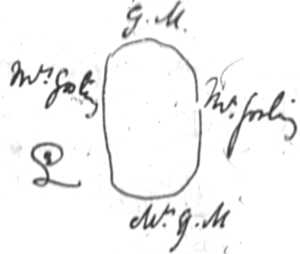This blog was devoted to the publication of Edward Lear's Diaries from 1 January 1858 to 12 May 1862. From January 2009 each was posted exactly 150 years after it was written and the project came to an end on 12 May 2012, the bicentenary of Lear's birth. The text is as exact as possible a transcript of Houghton Library MS Eng. 797.3. You can keep following the diaries at the new blog.
Thursday, 9 May 1861
Pitch dark ― miserable.
Could not work: except on the 2 Egyptian novelties. At 3 it was lighter, & Mrs. Mildmay, 2 Miss M.s Miss Clive & H.M. came & looked over drawings. Tom Fairbairn also came & Mrs. F.
Walked to Crake’s, but they had company.
Dined at home.
ἔφαγα και ἔπεα παρὰ πολὺ.1
[Transcribed by Marco Graziosi from Houghton Library, Harvard University, MS Eng. 797.3.]
- I ate and drank very much (NB). [↩]
Wednesday, 8 May 1861
Wet at times: dark always ― sometimes pitch dark fog.
Worked at putting all nick-nacks in closets: [secretion] in paper.
Later, ― wrote ― & sent letters ― to Giorgio Kokáli ― telling him to meet me at Leghorn by the end of the month: to Boyd ― Ellen, Sarah, Lady Goldsmid, Lady Waldegrave, & C.F. ―
At 4, walked out ― most beastly mud & fog. ― Called at Crake’s, Mr. C. returned. ― At Dixon’s ― a long way off. Saw all the Dixon family ― browny-berry children ― & a [patter] nice sort of mother.
Walked back by 6: seeing Mr. Whitmore. ― At 7.30 to the S. Gurney’s. Very magnificent home: ― wonderful heaps of unknown people. ― Sate next to a really nice girl ― a Miss Woodhouse: ― & t’other side ― a Mrs. Head, S.G.’s sister. (αὔτη ἔφαγε πολὺ!)1 Both of them pleasant. Who would have thought of the Gurneys & Annesley being connected? Yet one of the Hammonds married a Buxton. ― Dinner exceedingly sumptuous. Evening, looked at some clever drawings by Miss Woodhouse. ―
Cab home.
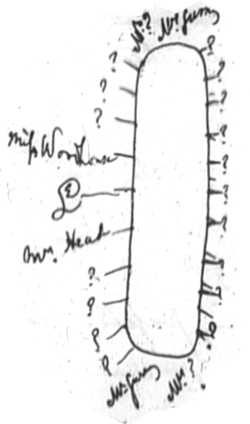
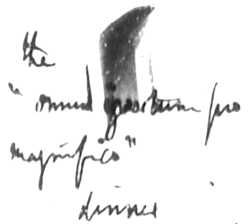
Why are women the greatest thieves?
Because they steel their petticoats, bone their stays, ― bag their hair, & crib their babies. ―
XX
[Transcribed by Marco Graziosi from Houghton Library, Harvard University, MS Eng. 797.3.]
- She ate a lot (NB). [↩]
Tuesday, 7 May 1861
Gloomy, gray, & bitter cold ― every day grows colder now.
C. Fortescue came just as I had done breakfast ― riding: he does not seem well ― as how con he well be?
I set to work to arrange the back room, & look over books &c. ― but grew very tired. Yet the whole of the back of the room must be arranged, before the Cedars are moved back. At 4 I went to Robersons, & gave orders about 9 boxes ― each with 2 Canvass, besides 2 for Mrs. Scrivens & Jameson, & one for Lord Clermont ― pretty well, 21 pictures!!! (But if to be done at Florence, Lucca, Spezzia, Bologna, Turin, Ravenna, or Switzerland, ποίος ἐξεύρει.?1 Called at Foord’s, & Wesley’s the oculists opticians: ―― he says I am at No. 12 in glasses, & at 14 it stops ― the sight. Pleasant.
Most disagreeable cold day. Home by 5.30, & papered up books in bookcases ― placing my Ciottere2 & other vagaries there also ―: but then dismantling my rooms brings fresh sorrow. Now there is no one to look for my return!
At 6.30 to George Middletons: only a sister of Mrs. M. ― & her husband there. Somehow those sisters have alquanto3 of vulgarity. But the evening passed. George M. is a truly kind fellow always. I am vexed when he sees I do not like his wife ― yet cannot help shewing I do not. Cab home. ― Bitter cold.
[Transcribed by Marco Graziosi from Houghton Library, Harvard University, MS Eng. 797.3.]
Monday, 6 May 1861
Drew 20£ from Drummonds
The Damascus went at 10. At 10.30 I went & placed it at Lady Farquhar: then to Drummonds, & James: ― Watercolor, New Watercolor, & Academy Exhibition. Paid a bill at Charltons, & home by 1.30.
… Duckworth, [Junr.]
W. Lushington | I out
Lady Georgiana Grey |
M. Halliday. |
Colonel Sykes
Mrs. Frith
Miss Frith
Miss Hodgkinson
Sir Walter Farquhar.
W. Lushington.
Lady Bethell
Gussie Bethell.
Janet Bethell.
Mr. Chapman
Miss Chapman.
Harrie Farquhar.
Arranged books by fits, between the coming of people. Verily, this mode of gaining bread may be a “mestier civile”1 ― but it is hard lines! ――
At 8 to Lady Farquhar
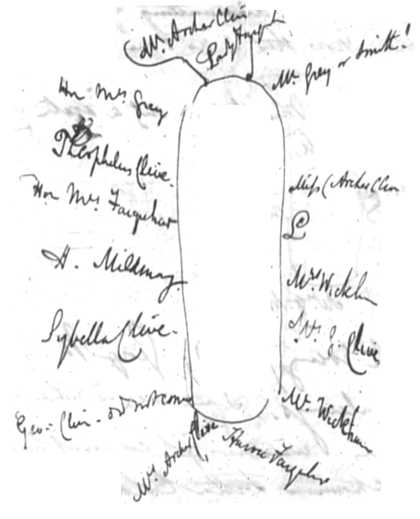
Mrs. Wickham was very funny. She would call “old Haryet & old Sarah Markham” ― “the deanery girls”! & Edward M. is going to marry again!! ―
“a very copious lady” added Mr. W.
[Transcribed by Marco Graziosi from Houghton Library, Harvard University, MS Eng. 797.3.]
- Civilized job. [↩]
Sunday, 5 May 1861
Dry ― dull, gray.
Rose late ― & breakfasted at 10.30 ― expecting W. Holman Hunt, but no-one came.
Passed all the morning ― arranging dearest Ann’s letters & ˇ[the] little things I shall always keep for her sake.
Lacäita came at 2 & staid more than half-an-hour, he really seems a very good fellow, malgrado1 ――
But is there anything so dreadful as a Sunday in London, ― when upset in body ˇ[or] mind, & although kept prisoner in the house, unable to apply to anything?
Partly I slept X.
Partly, inwardly moaning, paced up & down.
Crakes are away: W. Nevills I think also: Beadons ditto. Nor can I get out to call on Baring’s, Dr. Lushingtons, or any one else ― for fear of people coming who said they might come on this my last day of my painting being here. ―
At 5 I walked out: day very cold, dry, dusty. ― Called on Mrs. Crake, who was all alone. Mr. C. is pretty well at Hastings. The old lady spoke sadly enough about John’s death, but seems to look to Mr. C.’s as a mother ― of course ― as in fact it is, while the other was not so. She is somehow, as old Mr. Harness said once ― a half very clever woman, mute, as it were. I do not know but that it is more painful to be so acute to the [load] of life ― than to be gradually childish, like Lady Grey. ― It was too late to make other visits, so I walked back, looking at the new omnibuses, which gather crowds. ― Walked at 7 to the Blue Posts ― but it was full ― so I walked on ― (seeing Spedding & speaking to him for a moment,) ― & left a card on Massingberd, & asked after little Miss James: & after that, at 8 came again to the Blue Posts, & dined. ―
Home by 9.30 ― or 10. A weary dreary sad day.
[Transcribed by Marco Graziosi from Houghton Library, Harvard University, MS Eng. 797.3.]
- Notwithstanding. [↩]
Saturday, 4 May 1861
Showery ― Cedars.
Bright Smith. | vague
R. Jameson |
Mrs. Jameson |
Mrs. Coleridge |
Mr. Duckworth | pleasing
Mrs. Duckworth |
Miss Duckworth |
Mr. Simpkinson | tiresome
Mrs. Simpkinson. |
Miss Wagner |
Admiral Robinson | delightful
Mrs. Robinson. |
Mrs. Seymour | welcome &
Alfred Tennyson | pleasant
M. Halliday. ―― after I was out
At 6 ― resolving to go to Lady Waldegrave’s private theatricals, went & had my hair cut. But it was very cold, & I returned, resolving not to go.
So I didn’t.
But dined at tome on 2 mutting chops, & read Emerson Tennent,1 very peaceably.
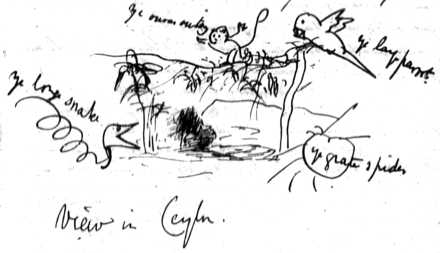
[Transcribed by Marco Graziosi from Houghton Library, Harvard University, MS Eng. 797.3.]
- Perhaps Sir James Emerson Tennent’s Ceylon. An Account of the Island Physical, Historical, and Topographical. 2 vols. London: Longman, Green, Longman, and Roberts, 1959; or the older The History of Modern Greece. 2 vols. London: Henry Colburn and Richard Bentley, 1830, still under the name of James Emerson, Esq. [↩]
Friday, 3 May 1861
Warmer, darker, damper.
Cedars
Saw in the papers, 2 “events.” C. Newton’s marriage to Mary Severn. And the death of
“Eliza A. Vigors, aged 65, widow of the late N.A. Vigors, [Sqr.] M.P. at her brother in law’s home, James Keymer ― Dartford.”
Poor Mrs. V.! a sad life hers! ― Bye the bye she is the original of my story of “is it your boles you’re neglecting ― you bad buold boy! your boles, wh. ought to be the chiefest care of your life, & yere been & aten eet & twenty orrnges before bkfast! ―” ― but she must have been 75 ― for Ferdinand is nearly 50.
Mrs. North
Catherine North.
Caarl Haag.
F. Cary.
Lady Farquhar
Miss North | after I was out
Mrs. Marsh |
Painted by fits at the Cedars till 4.30 ― when I walked to the Zoological Gardens ― where I dined on ’am & bread, & saw the “Bore constructor” eat rabbits & dux.
Walked home by 8.30.
[Transcribed by Marco Graziosi from Houghton Library, Harvard University, MS Eng. 797.3.]
Thursday, 2 May 1861
Fine, dry ―
Cedars
James Edwards.
Mr. Brocklesbank.
Mr. Francillon.
Edith Francillon
Mrs. Francillon
Charles Dixon.
Mr. Gush.
Mrs. Gush.
S.W. Clowes
George Clowes
Mr. S. Gurney
Mrs. S. Gurney
Mrs. Prideaux
Miss Prideaux
Mrs. Bouverie
3 small Bouveries
Miss Seymour
Mr. Fry
Mrs. Buxton
Miss Hammond. 20
Worked very little, at Cedars ― comfortless & dreary.
And what a hustle of people!
The kindly dear good true Emily Francillon was of the nicest. And also C. Dixon, whom I now remember well at Sass’s ―― always a gentlemanlike youth ― or boy ― they called him the Creole. ― He staid some time, & really seemed a thoroughly nice fellow.
The Gush visit was what B.H.H. would call ――― painful. ―― So was that of the 2 Clowes: ― S.W.C. always seems the brightest & best of that lot, had his wife but lived!
The Bouverie party were ― slow: yet not so much so as of old: & there is a dear little girl very bright. Mrs. Buxton was pleasant ― but the room was crowded ― & it must be said of the S. Gurneys ― she is “profoundly uninteresting” ― & he is a very frightful bore. “All kinds” of people also came ― & I was so glad when they all went away! ―
At 7 dined alone.
Wrote to Foord, to make a new frame for Masada.
[Transcribed by Marco Graziosi from Houghton Library, Harvard University, MS Eng. 797.3.]
Wednesday, 1 May 1861
X
Fine & dry ever.
Cedars
Poor Mary’s birthday!
Working ― little enough, at Cedars, early, but more as the day went on ― up till 6 o’clock. ―
I think they will finish themselves in a few days.
James Uwins.
Mr. North
Miss North.
Lady Grey
Miss ― ?
Matt Wyatt.
Mr. Edwards.
James Edwards.
P. Bouverie.
A letter from Ellen, with a very sad one from Sarah: ― I hardly think poor dear Mary will live to return.
[She had been dead 6 days when this was written ― on the 24th April she died at sea! (June 29 1861)]1
Did not go out all day, till 7.45, when I dined at Lady Farquhar’s. ―

Dinner pleasant: ― table of presents to Sybella Clive: what thousands of pounds worth! A 3 sided seal from T. Hamilton is pretty ― with this dedication “3 antiques from a 4th.[”] ―
X
[Transcribed by Marco Graziosi from Houghton Library, Harvard University, MS Eng. 797.3.]
- Added in a box later. [↩]
Tuesday, 30 April 1861
Note from H. Mildmay ― & £350― for Damascus. {Began on canvass 17. Febry. 1860
Charles G. Wynne.
C.G. Wynne ― Juniorissimo.
Mr. Mildmay.
Miss Clive
Worked at Cedars, & wrote many notes. Went out at 5 ― called on F. Sykes, & F. Thrupp, the last very dreamy: ― then to have my hair cut, but the rooms were full, so I came away, & returning up Bond St. lo! John E. Cross, & a little boy, who was Henry Phipps Denison. They 2 came home with me & saw the pictures & then the dear little chap played so beautifully! ― The “Cloches du Monastere” for example! So I gave him a Calabria and 3 songs, greatly pleased both of us. To dinner at 7.30 to Sir W. James’s.

Evening quiet & not unagreable. ― Lady Cranworth very pleasant & amusing.
[Transcribed by Marco Graziosi from Houghton Library, Harvard University, MS Eng. 797.3.]
